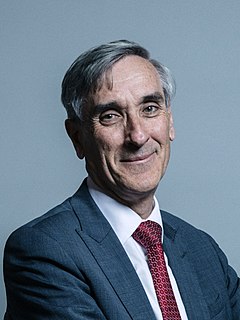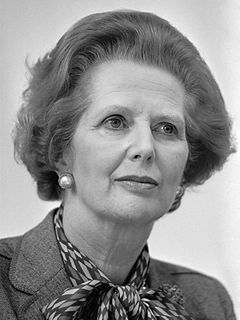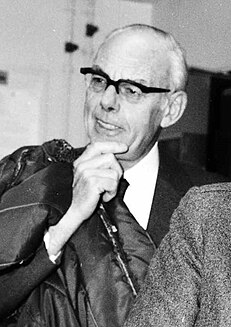Reception
In interviews to promote the book, Thatcher claimed that the Conservatives had lost their way because they were "not being Conservative enough". In the book Thatcher wrote that: "I offer some thoughts about putting these things right. It is now, however, for others to take the action required". These words—similar to those used by Geoffrey Howe in 1990 which had precipitated her downfall—led to Major on 22 June resigning as Conservative leader and calling a leadership election. John Redwood stood against Major. Thatcher was in America at the time of the first ballot and she remained neutral, claiming that both Major and Redwood were "good Conservatives".

Richard Edward Geoffrey Howe, Baron Howe of Aberavon,, known from 1970 to 1992 as Sir Geoffrey Howe, was a British Conservative politician.

The 1995 Conservative Party leadership election was initiated when the incumbent leader and Prime Minister, John Major, resigned as leader on 22 June 1995, in order to face his critics within the party. On 4 July 1995, he was re-elected, beating the only other candidate, the former Secretary of State for Wales, John Redwood.

Sir John Alan Redwood is a British Conservative Party politician, and Member of Parliament (MP) for Wokingham in the county of Berkshire. He was formerly Secretary of State for Wales in Prime Minister John Major's Cabinet, and was twice an unsuccessful challenger for the leadership of the Conservative Party in the 1990s.
Talking to her close friend Woodrow Wyatt on 22 May 1995, Thatcher said to him that the Sunday Times "distorted what I wrote" and that her line about policies being carried out by others meant not replacing Major but the whole Western world, the Council of Europe, etc. Later that day, Major said to Wyatt: "I'm bloody angry and I'm going to giver her a hell of an attack and go for her". In his memoirs, Major wrote: "Her descriptions of a Grantham childhood were harmless enough, but the book contained an epilogue, unrelated to the title or scope of the book itself, which could only be interpreted as an attack on my own policies. Such blows from my predecessor were impossible to disregard, since every interviewer raised them with me at every opportunity, as she must have known they would".

Woodrow Lyle Wyatt, Baron Wyatt of Weeford was a British politician, author, journalist and broadcaster, close to the Queen Mother, Margaret Thatcher and Rupert Murdoch. For the last twenty years of his life, he was chairman of the state betting organisation The Tote.

Norman Beresford Tebbit, Baron Tebbit,, is a British politician and life peer. A member of the Conservative Party, he served in the Cabinet from 1981 to 1987 as Secretary of State for Employment (1981–83), Secretary of State for Trade and Industry (1983–85), Chancellor of the Duchy of Lancaster (1985–87) and Chairman of the Conservative Party (1985–87). He was a member of parliament (MP) from 1970 to 1992, representing the constituencies of Epping (1970–74) and Chingford (1974–92).

Thatcherism comprises the conviction, economic, social and political style of the British Conservative Party politician Margaret Thatcher, who was leader of her party from 1975 to 1990. It has also been used to describe the principles of the British government under Thatcher as Prime Minister from 1979 to 1990 and beyond into the governments of John Major, Tony Blair and David Cameron. An exponent of Thatcherism is regarded as a "Thatcherite". Thatcherism represented a systematic, decisive rejection and reversal of the post-war consensus, whereby the major political parties largely agreed on the central themes of Keynesianism, the welfare state, nationalised industry and close regulation of the British economy. There was one major exception, the NHS, which was widely popular. In 1982, she promised the British people that the NHS is "safe in our hands".

Kenneth Harry Clarke, often known as Ken Clarke, is a British Conservative politician who has been the Member of Parliament for Rushcliffe since 1970. He is currently the Father of the House.

The 1987 United Kingdom general election was held on Thursday, 11 June 1987, to elect 650 members to the House of Commons of the United Kingdom. The election was the third consecutive general election victory for the Conservative Party, and second landslide under the leadership of Margaret Thatcher, who became the first Prime Minister since the Earl of Liverpool in 1820 to lead a party into three successive electoral victories.

Sir Denis Thatcher, 1st Baronet, was a British businessman and the husband of Margaret Thatcher, who served as the first female Prime Minister of the United Kingdom.

The Brighton hotel bombing was a Provisional Irish Republican Army (IRA) assassination attempt against the top tier of the British government that occurred on 12 October 1984 at the Grand Brighton Hotel in Brighton, England. A long-delay time bomb was planted in the hotel by IRA member Patrick Magee, with the purpose of killing Prime Minister Margaret Thatcher and her cabinet, who were staying at the hotel for the Conservative Party conference. Although Thatcher narrowly escaped the blast, five people connected with the Conservative Party were killed, including a sitting Conservative MP, and 31 were injured.

William John Biffen, Baron Biffen, PC, DL was a Conservative member of the House of Lords, who previously spent 36 years in the House of Commons and served in Margaret Thatcher's Cabinet.
Alastair Brian Walden was a British journalist and broadcaster who spent over a decade as a Labour Member of Parliament. He was considered one of the finest political interviewers in the history of British broadcasting, tenacious and ruthless. He won awards for broadcasting including the BAFTA Richard Dimbleby Award for television in 1986, and in 1991 was named ITV personality of the year. He was known for interviews of politicians, especially Margaret Thatcher. He was said to be her favourite interviewer, although he gave her tough interviews.

During the 1980s, members of the Conservative Party in Britain who opposed some of the more hard-line policies of Prime Minister Margaret Thatcher were often referred to by their opponents as "wets". Thatcher coined the usage in 1979–80, with the meaning of feeble, lacking hardness, or willing to compromise with the unions. The label was especially applied to senior members of her government who were nevertheless outside Thatcher's inner circle and who expressed opposition to her strict monetarist policies designed to tackle inflation and her cuts to public spending.

The 1990 Conservative Party leadership election in the United Kingdom took place on 20 November 1990 following the decision of Michael Heseltine, former Defence and Environment Secretary, to challenge Margaret Thatcher, the incumbent Prime Minister, for leadership of the Conservative Party.
Sir George Arthur Gardiner was a British Conservative Party politician and journalist. Two months before the 1997 general election he defected to the Referendum Party, becoming the only MP it ever had. The party dissolved later that year.

Robin Harris is a British author and journalist. He has written for The Daily Telegraph and Prospect. He attained his undergraduate degree and doctorate in modern history from Exeter College, Oxford University.
Petronella "Petsy" Wyatt is a British journalist and author.

The Downing Street Years is a memoir by Margaret Thatcher, former Prime Minister of the United Kingdom, covering her premiership of 1979 to 1990. It was accompanied by a four-part BBC television series of the same name.
This bibliography includes major books and articles about British prime minister Margaret Thatcher and her policies.
Allegations of racism in the Conservative Party have been made over recent decades. Conservative shadow defence minister Enoch Powell's "Rivers of Blood" speech in 1968 was both influential and widely regarded as anti-immigrant with racist overtones, although some Conservative MPs defended Powell's speech. Since then, accusations have been made about several leading members of the party and its policies; these have related to prejudice against non-white people.




















